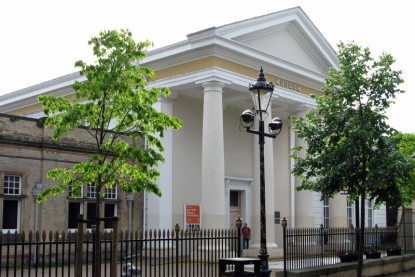Find out more about The Open University's Criminology courses and qualifications
Many people believe that, in stark contrast to sex between men, sex between women has never been prosecuted. It is assumed that lesbianism was unknown to lawmakers, or disbelieved by them, or too embarrassing to explain. Women’s intimate relationships are imagined as untroubled by a criminal justice system which perhaps didn’t even impose a minimum age of consent to sex until recently. The urban myth that sex between women was not criminalised because Queen Victoria would not believe it happened remains popular today.
It is, though, a myth. Judges, MPs and peers of the eighteenth and nineteenth centuries were well aware that lesbianism existed, and could quote classical Roman and Greek authors to prove it. (Many of them would also be familiar with sex between women in pornography, but they did not mention that in Parliament or the courts!) Sex between women was mentioned in medical texts and satirical attacks, if not in polite society. Its existence among working-class and foreign women was treated as an open secret between men: the law kept silent about it because those ruling-class men did not want respectable women – their wives and daughters – to find out.
In fact, there had been prosecutions of women for lesbian relationships since at least the end of the seventeenth century.
In the eighteenth century, there was a small number of cases where apparently heterosexual couples married but the ‘husband’ was later found to be legally female. (Some of those marriages would today be understood as between women and trans men, but the courts were sure they were dealing with women disguised as men.)
These ‘husbands’ were harshly punished for financial fraud because, by law, a woman’s possessions became her husband’s property as soon as the couple married. However, since most of the wives were working-class and poor, we can be fairly certain that financial fraud was not the defendants’ motive: the cases were called frauds as a way of hiding what they were really about.
Those prosecutions disappeared later in the nineteenth century as the silencing of lesbianism became stricter. Respectable women were increasingly assumed to be sexually innocent and either passive or desireless. The best way to stop them trying a lesbian relationship was to ensure they were unaware of the possibility. Nonetheless, an Old Bailey judge in 18851 considered it obvious that the indecent assault of one woman by another was an offence – and thus there was an age of consent since the law stated that girls under thirteen could not give consent. That was confirmed by the Court of Appeal in 1934, by which time the age of consent was sixteen.2
If the courts were willing to convict and punish women for same-sex relationships, why was there no specific offence? Records of parliamentary debates in 1921 show that MPs and peers were afraid it would publicise lesbianism and encourage respectable women to try it. These men were debating whether ‘gross indecency’ between women should become a crime. The MPs who introduced the proposal – as a tactic to waste parliamentary time – claimed that lesbianism was a growing problem. Other MPs and peers were unconvinced: a former Director of Public Prosecutions said criminalisation ‘would [make] public to thousands of people that there was this offence; that there was such a horror.’3 One MP argued that ‘to leave them entirely alone, not notice them, not advertise them … is the method that has been adopted in England for many hundred years.’4 The Bill failed, and lesbianism remained silenced – but not accepted.
A few years later, Radclyffe Hall’s novel The Well of Loneliness was found obscene because it suggested that lesbianism should be tolerated rather than condemned. The following year, 1929, ‘Colonel Barker’ was identified as Valerie Arkell-Smith and convicted of perjury for marrying a woman under their male name. The judge denounced Barker as having ‘profaned the House of God … outraged the decencies of nature, and … broken the laws of man.’5 Silence was not the same as toleration.
Today, the law on sexual offences is equal and gender-neutral in theory. However, concerns remain about the treatment of lesbians - and trans men - by the courts. For example, ‘gender fraud’ cases (the contemporary equivalent of ‘husband’ prosecutions) are controversial. As the history of lesbianism and the criminal law shows us, the absence of discriminatory legislation does not ensure that all people are treated equally.
 Click on the banner to check out more related content from our LGBT HUB
Click on the banner to check out more related content from our LGBT HUB






Rate and Review
Rate this article
Review this article
Log into OpenLearn to leave reviews and join in the conversation.
Article reviews
You could compare it to todays law governement, you don't see them creating law to halt MP expenses. I mean.. how many of them would not benefit from that?
I also think that the law took so long to address lesbians because the media blew out the gay men of society, the media focused on it so much that the government responded to that and that only.
These comments are not meant to offend, only ideas.